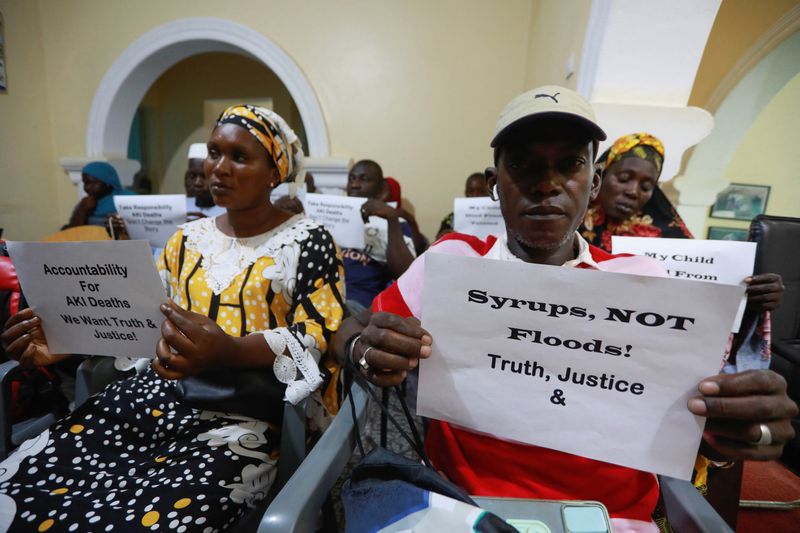Exclusive – Gambia tightens rules for Indian drugs after cough syrup deaths: letter
2023.06.20 15:05

© Reuters. FILE PHOTO: Grieving parents hold up signs during a news conference, calling for justice for the deaths of children linked to contaminated cough syrups, in Serekunda, Gambia, November 4, 2022. In October 2022, the deaths of more than 70 Gambian children f
By Krishna N. Das and Edward McAllister
NEW DELHI (Reuters) – Gambia will make it mandatory for all pharmaceutical products from India to be inspected and tested prior to shipment from July 1, according to Gambian government documents reviewed by Reuters, the first known restrictions on national exports following the deaths of dozens of children linked to Indian-made cough syrups.
The new rule highlights how governments are reassessing their reliance on India’s $42 billion pharmaceutical industry since the contamination came to light last year. India’s industry supplies nearly half of the pharmaceuticals used in Africa. In April, India’s government said its officials had held meetings in Africa to ensure its drug exports did not suffer after at least 70 children died in Gambia after ingesting the cough syrup last year.
Gambia’s latest move is to “address issues related to substandard and falsified (counterfeit) medicines entering the country”, the executive director of its Medicines Control Agency (MCA), Markieu Janneh Kaira, wrote in a letter to India’s drug controller general, Rajeev Singh Raghuvanshi, dated June 15. The letter said that the MCA had appointed Quntrol Laboratories, an independent inspection and testing company for pharmaceuticals based in Mumbai, to issue a so-called Clean Report of Inspection and Analysis (CRIA) for all shipments from India.
“Quntrol shall conduct document verification, physical inspection of the consignment and sampling, for laboratory testing for each shipment,” the letter said. “If conformity is established at all levels, Quntrol shall issue the mandatory CRIA document. If conformity is not established with regards to the quality of the product, the shipment will be quarantined or seized by the MCA and the necessary regulatory actions shall be taken.”
Janneh Kaira told Reuters the rule “applies to India for now only”. Since June 1, India has made tests mandatory for all cough syrups before they are exported.
Raghuvanshi did not immediately respond to a request for comment outside regular business hours.
With 2.5 million people, Gambia is one of Africa’s smallest and poorest countries. The World Bank is funding a testing laboratory in Gambia but it is not yet finished. The letter said Quntrol would send samples for testing to “one of the analytical laboratories approved by MCA”. It did not say if the laboratory would be based in India or elsewhere. At least 70 children, most of them under the age of 5, died in Gambia last year due to acute kidney injury that doctors have linked to adulterated cough syrups from India. The World Health Organization said last year that the India-made cough syrups contained lethal toxins ethylene glycol and diethylene glycol – commonly used in car brake fluid and other products not fit for human consumption. These ingredients can be used by unscrupulous actors as a substitute for propylene glycol, which is a key base of syrupy medicines – because they can cost less than half the price – manufacturing experts say.








